Filter by

Civil Society and Gender Relations in Authoritarian and Hybrid Regimes; New T…
Is civil society’s influence favorable to the evolvement of democratic structures and democratic gender relations?
- Edition
- -
- ISBN/ISSN
- 9783847407294
- Collation
- -
- Series Title
- -
- Call Number
- 305.3
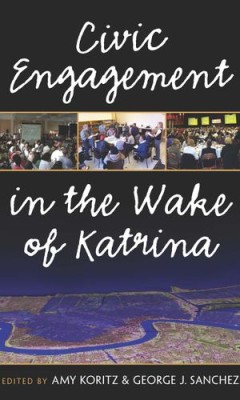
Civic Engagement in the Wake of Katrina
Civic engagement has been underrated and overlooked. Koritz and Sanchez illuminate the power of what community engagement through art and culture revitalization can do to give voice to the voiceless and a sense of being to those displaced
- Edition
- -
- ISBN/ISSN
- 9780472900428
- Collation
- -
- Series Title
- -
- Call Number
- 363.3481 SAN c
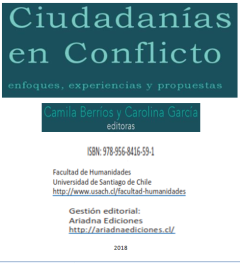
Ciudadanías en conflicto; Enfoques, experiencias y propuestas
Las transformaciones políticas, económicas, sociales y culturales de las últimas décadas, han posicionado a la ciudadanía como tema de interés público, generando un amplio debate en torno a su conceptualización y a las características del modelo educativo que se requiere para la formación ciudadana.
- Edition
- -
- ISBN/ISSN
- 9789568416591
- Collation
- -
- Series Title
- -
- Call Number
- 300.1 BER c

City of Strangers; Gulf Migration and the Indian Community in Bahrain
Exploring the everyday experiences of workers from India who have migrated to Bahrain, this study contributes significantly to our understanding of politics and society among the Persian Gulf states and of the migrant labor phenomenon that is an increasingly important aspect of globalization
- Edition
- -
- ISBN/ISSN
- 9780801476020
- Collation
- -
- Series Title
- -
- Call Number
- 301 GAR c
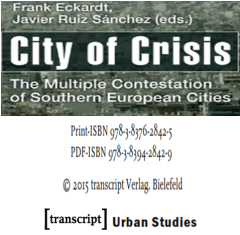
City of Crisis; The Multiple Contestation of Southern European Cities
The ongoing crisis in Europe has dramatic impact on the life in many Southern European cities: Unemployment, social deprivation, poverty, political instability, severe cuts in the welfare state budgets and a wide spread feeling of despair have eroded much of the social foundation of the cities
- Edition
- -
- ISBN/ISSN
- 9783837628425
- Collation
- -
- Series Title
- -
- Call Number
- 307.76 ECK c

City in Sight
Huge social transformations and turbulent political events - 9/11 and the political murders of Pim Fortuyn and Theo van Gogh - have put urban issues high on the political agenda of the Netherlands
- Edition
- -
- ISBN/ISSN
- 9789089641694
- Collation
- -
- Series Title
- -
- Call Number
- 300 NIE c
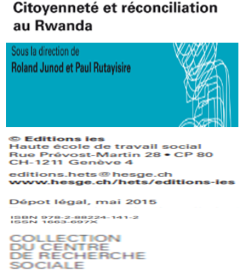
Citoyenneté et réconciliation au Rwanda
This action research jointly undertaken by the Center for Conflict Manage-ment in Butare and the Haute Ecole de Travail Social in Geneva aims at analysing and supporting pilot experiences by community actors in post-genocide Rwanda
- Edition
- Vol. 12
- ISBN/ISSN
- 9782882241412
- Collation
- -
- Series Title
- -
- Call Number
- 363.3481 RUT c
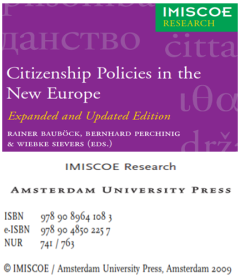
Citizenship Policies in the New Europe: Expanded and Updated Edition
The two most recent EU enlargements in May 2004 and in January 2007 have greatly increased the diversity of historic experiences and contemporary conceptions of statehood, nation-building and citizenship within the Union.
- Edition
- -
- ISBN/ISSN
- 9789089641083
- Collation
- -
- Series Title
- -
- Call Number
- 300 SIE c

Citizens and Groups in Contemporary China
Citizens and Groups in Contemporary China began with two symposia held in 1977 and 1978.
- Edition
- -
- ISBN/ISSN
- 9780472901845
- Collation
- -
- Series Title
- -
- Call Number
- 305.8951 FAL c
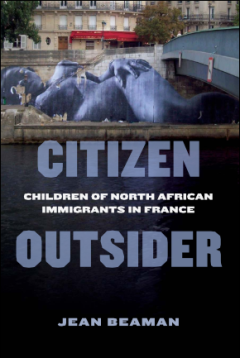
Citizen Outsider; Children of North African Immigrants in France
While portrayals of immigrants and their descendants in France and throughout Europe often center on burning cars and radical Islam, Citizen Outsider: Children of North
- Edition
- -
- ISBN/ISSN
- 9780520294264
- Collation
- -
- Series Title
- -
- Call Number
- 304.809 BEA c
 Computer Science, Information & General Works
Computer Science, Information & General Works  Philosophy & Psychology
Philosophy & Psychology  Religion
Religion  Social Sciences
Social Sciences  Language
Language  Pure Science
Pure Science  Applied Sciences
Applied Sciences  Art & Recreation
Art & Recreation  Literature
Literature  History & Geography
History & Geography